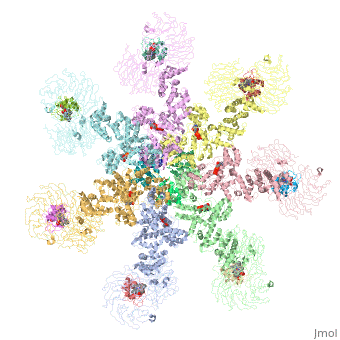Apoptotic protease-activating factor
Jump to navigation
Jump to search
FunctionApoptosis protease-activating factor-1 or Apoptosis peptidase-activating factor-1 (APAF-1) binds to cytochrome c and ATP to form the apoptosome which leads to the recruitment and activation of caspase 9 by cleaving the procaspase 9. Caspase 9 is involved in executing the apoptosis of cells[1]. DiseaseInactivation of Apaf-1 is implicated in disease progression and chemoresistance of some malignancies[2]. Structural highlightsApaf-1 contains several copies of the WD-40 domain which are involved in binding to cytochrome c[3]., caspase recruitment domain (CARD) and an ATPase domain.
3D structures of apoptotic protease-activating factor-1Apoptotic protease-activating factor-1 3D structures
|
| ||||||||||
ReferencesReferences
- ↑ Riedl SJ, Li W, Chao Y, Schwarzenbacher R, Shi Y. Structure of the apoptotic protease-activating factor 1 bound to ADP. Nature. 2005 Apr 14;434(7035):926-33. PMID:15829969 doi:10.1038/nature03465
- ↑ Furukawa Y, Sutheesophon K, Wada T, Nishimura M, Saito Y, Ishii H, Furukawa Y. Methylation silencing of the Apaf-1 gene in acute leukemia. Mol Cancer Res. 2005 Jun;3(6):325-34. PMID:15972851 doi:http://dx.doi.org/10.1158/1541-7786.MCR-04-0105
- ↑ Shalaeva DN, Dibrova DV, Galperin MY, Mulkidjanian AY. Modeling of interaction between cytochrome c and the WD domains of Apaf-1: bifurcated salt bridges underlying apoptosome assembly. Biol Direct. 2015 May 27;10:29. doi: 10.1186/s13062-015-0059-4. PMID:26014357 doi:http://dx.doi.org/10.1186/s13062-015-0059-4
